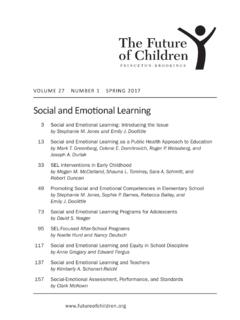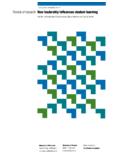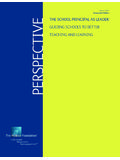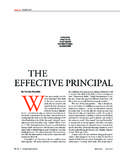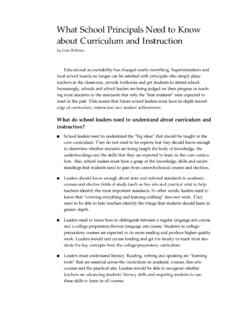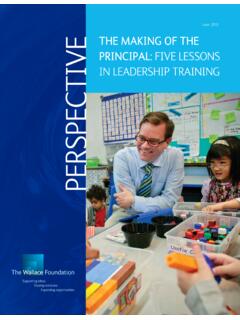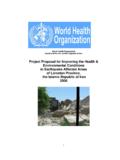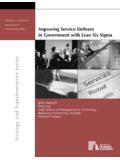Transcription of ImprovIng UnIversIty prIncIpal preparatIon programs
1 ImprovIng UnIversIty prIncIpal preparatIon programs Five Themes From The FieldCopyright 2016 The Wallace FoundationAll rights reserved This publication emerges from The Wallace Foundation s commitment to developing knowledge about both the role of principals in shaping better public school education and the actions that could be taken to ensure that these school leaders are as effective as possible. It draws on four reports commissioned by Wallace to gain greater insight into views on UnIversIty -based training for aspiring school leaders as well as the state and UnIversIty environments in which prIncIpal preparatIon programs operate.
2 We appreciate the contributions of the four organizations that wrote the reports: the American Association of Colleges for Teacher Education; AASA, The School Superintendents Association; the American Institutes for Research; and the UnIversIty Council for Educational Administration. In addition, we are indebted to Jacquelyn Davis for working with Wallace staff members to make sense of the four reports and then synthesizing the findings and writing this publication. Editor: Pamela MendelsDesign: Jos MorenoPhotos: Cover, Bruce Leighty/Getty Images; p. 4, jweise /Getty ImagesImprovIng UnIversIty prIncIpal preparatIon programs Five Themes From The Fieldtable of contents 4 IntrodUctIon6 dIstrIct leaders largely dIssatIsfIed wIth program qUalIty.
3 Many UnIversItIes belIeve programs have room for Improvement8 strong UnIversIty -dIstrIct partnershIps: essentIal to hIgh-qUalIty preparatIon bUt far from UnIversal9 coUrse of stUdy does not always reflect prIncIpals jobs 9 facUlty members wIth school leadershIp experIence 10 cUrrIcUlUm stressIng what prIncIpals need to know and do 10 clInIcal experIences12 some UnIversIty polIcIes and practIces can hInder change14 states have aUthorIty to Improve prIncIpal preparatIon , bUt many are not UsIng It as effectIvely as they coUld 15 assessIng the polIcy envIronment of states16 conclUsIon18 appendIx104 ImprovIng UnIversIty prIncIpal preparatIon programs .
4 FIvE tHEMES FroM tHE FIElDIntrodUctIonWhat is the state of UnIversIty -based prIncIpal preparatIon programs ? How are these essential training grounds of future school leaders viewed by themselves as well as by the school districts that hire their graduates? Do the programs need to improve? If so, by what means? This publication seeks to help answer those questions by bringing together findings from four recent reports, one each by the American Association of Colleges for Teacher Education (AACTE), The School Superinten-dents Association (AASA), the American Institutes for Research (AIR), and the UnIversIty Council for Edu-cational Administration (UCEA).
5 Written in early fall 2015, the reports draw from literature reviews, new field surveys, interviews with experts, focus groups and/or analyses of state regulations to shed light on matters including perceived strengths and weakness-es of programming, barriers to program improve-ment, and the role of states and school districts in shaping programming. Taken together, they provide fresh insights and confirm some research the field has already known about the landscape of universi-ty-based prIncIpal preparatIon Wallace Foundation, a national philanthropy, commissioned the reports to inform its development of a potential new UnIversIty prIncIpal preparatIon program initiative.
6 Wallace has worked on school leadership since 2000, driven by the idea that princi-pals have a crucial role in fostering student achieve-ment, a notion reinforced by a landmark study that found that leadership is second only to teaching among school influences on student the power of the prIncIpal to aid student learn-ing, it is perhaps little wonder that the four reports found near unanimity among both those who train and those who hire school leaders of the job s signif-icance, as shown in the chart on the following page. 1 Leithwood, K., Seashore Louis, K, Anderson, S.
7 & Wahlstrom, K. (2004). How Leadership Influences Student Learning. Toronto, Ontario: Center for Applied Research and Educational Improvement and Ontario Institute for Studies in Education. 5tHE WAllACE FounDAtIonIt would also stand to reason, then, that future school leaders should be receiving meticulous preparatIon for the job. And yet, as suggested in this publication, there is concern that many of the 700 or so universi-ty-based programs in the United States2 may be falling short. A related concern is that efforts to improve pro-gramming on a wide scale would likely be complex, requiring changes in both state policy and the institu-tional workings of synthesis of the four reports that follows echoes other recent research and practice studies to bear out the points above.
8 In addition to confirming close-to-unanimous agreement about the import-ant role of the school prIncIpal in advancing student achievement, it finds five themes: District leaders are largely dissatisfied with the quality of prIncIpal preparatIon programs , and 2 Data from the federal Integrated Postsecondary Education Data System (IPEDS) show that in 2012-13, the latest year available, 706 institutions of higher education offered a master s degree in educational administration (a common on-ramp for prIncIpal certification). Manna, P. (2015). Developing Excellent School Principals to Advance Teaching and Learning: Consider-ations for State Policy, New York, NY: The Wallace Foundation.
9 Nonprofit and district preparatIon programs account for 16 percent of prIncIpal prepa-ration programs . Briggs, K, Cheney G., Davis, J., & Moll, K., (2013). Oper-ating in the Dark: What Outdated State Policies and Data Gaps Mean for Effective School Leadership, Dallas, TX: The George W. Bush universities believe that their programs have room for improvement. Strong UnIversIty -district partnerships are essen-tial to high-quality preparatIon but are far from universal. The course of study at preparatIon programs does not always reflect principals real jobs. Some UnIversIty policies and practices can hinder change.
10 States have authority to play a role in ImprovIng prIncIpal preparatIon , but many are not using this power as effectively as four reports prepared for Wallace were designed to gather information for which each of the author or-ganizations has distinct access (for example, through a survey of the group s members). Wallace recognizes that the organizations use differing methods and have differing practices for such information-gathering ac-tivities. For more information on the reports, please see the Appendix. BoTh disTricTs and UniversiTies agree PrinciPals are imPorTanT To ImprovIng sTUdenT achievemenT106 ImprovIng UnIversIty prIncIpal preparatIon programs : FIvE tHEMES FroM tHE FIElDdIstrIct leaders are largely dIssatIsfIed wIth the qUalIty of prIncIpal preparatIon programs , and many UnIversItIes belIeve that theIr programs have room for preparatIon is the pathway for aspiring principals to develop the knowledge, skills and dis-positions they need to be effective school leaders.
